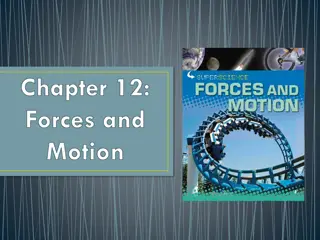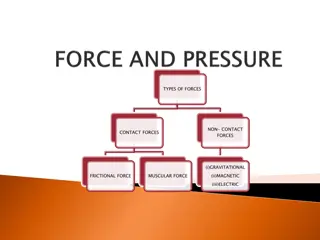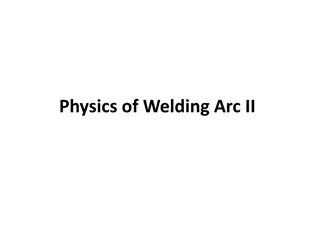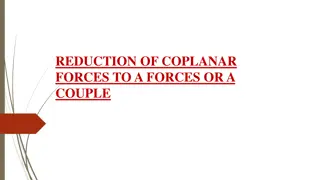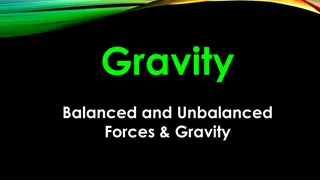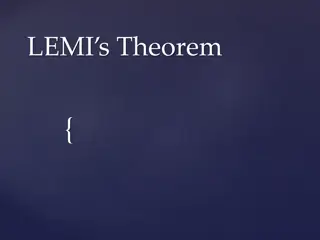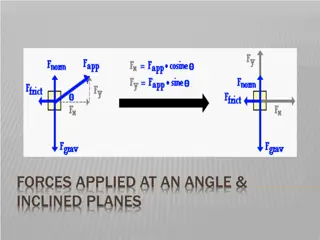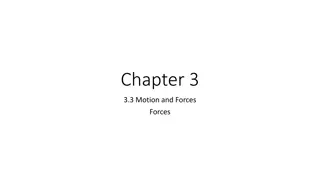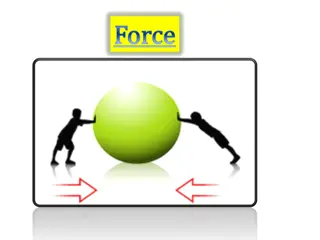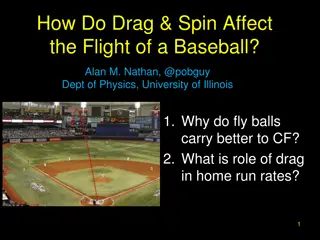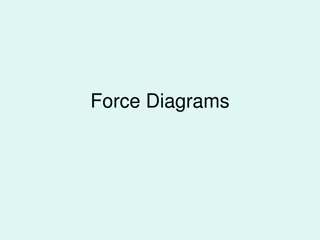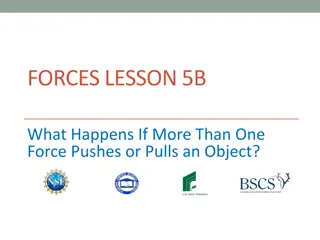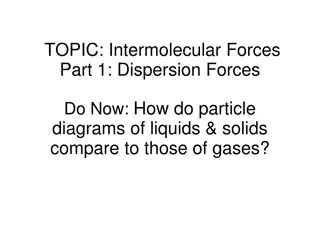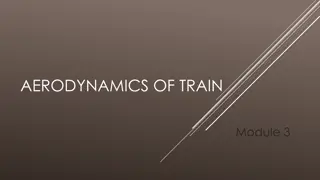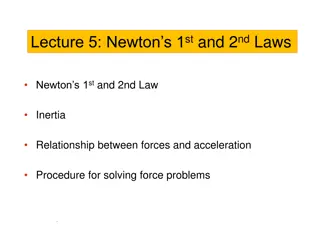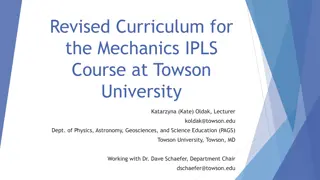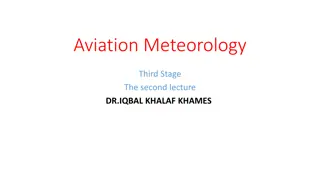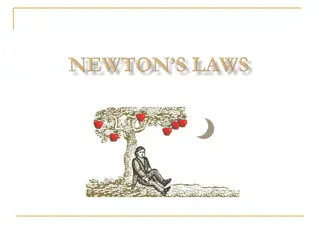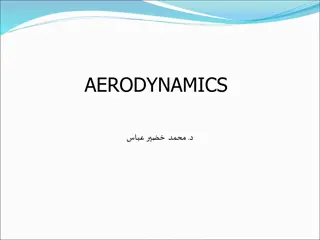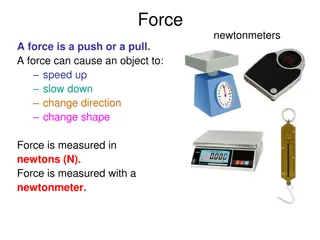Forces and Motion in Physics
Exploring the concepts of forces and motion, this content delves into the fundamental aspects of how forces impact objects' movement. Covering topics such as measuring force, representing force as a vector, combining forces through addition and subtraction, and understanding balanced and unbalanced
5 views • 61 slides
Boundary Layers in Fluid Dynamics
A boundary layer forms when a fluid flows over a solid surface, with viscous forces present close to the surface. It can be laminar or turbulent, determined by the Reynolds number. Flow separation occurs in adverse pressure gradients, affecting lift and causing drag. Efforts to delay separation incl
3 views • 19 slides
Action and Reaction Forces in Physics
Explore the concept of action and reaction forces in physics through examples like a falling boulder and interactions between different masses. Understand how forces are equal and opposite, leading to accelerations based on mass and force interactions. Discover the relationship between Earth and the
2 views • 16 slides
Different Types of Forces and Their Applications
This content explores various types of forces including non-contact and contact forces such as gravitational, magnetic, electric, frictional, and muscular forces. It also discusses the effects of forces on different surfaces and provides examples of force application in real-life scenarios.
4 views • 10 slides
Arc Forces in Welding: Gravity and Surface Tension Forces
Explore the significance of arc forces in welding, focusing on gravity and surface tension forces. Learn how these forces impact metal transfer, deposition efficiency, and welding quality. Discover the role of gravitational force in detachment and transfer of molten metal, and how surface tension fo
7 views • 25 slides
Coplanar Forces and their Classification
Coplanar forces are forces that lie in the same plane and can be classified into concurrent, parallel, non-concurrent, and non-parallel systems. These forces can be reduced to a single force or a couple for analysis. Understanding these force systems is essential in engineering and physics to determ
6 views • 20 slides
Central and Non-Central Forces in Physics
Newton's laws of motion introduced the concept of forces, leading to the classification of fundamental forces like gravitational, electromagnetic, strong nuclear, and weak nuclear forces. Central forces act toward or away from a fixed center, while non-central forces are affected by additional param
2 views • 7 slides
Van der Waals Forces and Intermolecular Interactions
Van der Waals forces encompass London dispersion forces, dipole-dipole forces, and hydrogen bonding, influencing interactions between atoms and molecules. London dispersion forces are the weakest and present in all molecules, dipole-dipole forces involve permanent dipoles, and hydrogen bonding, the
16 views • 9 slides
Forces in Physics
Explore the concept of forces in physics, including definitions, measurement units, combining forces, and their effects on objects' motion. Learn about balanced and unbalanced forces, net force, force pairs, directions, magnitude, and how to combine forces at right angles. Develop a solid understand
4 views • 24 slides
The Design of Airfoils and Wing Dihedral
The design of airfoils and wings involves key terminologies like mean chamber line, leading edge, trailing edge, chord line, and camber. Dihedral is an important aspect of wing design that affects stability and control. Aerodynamic forces on a wing, like lift and drag, are crucial for flight perform
5 views • 10 slides
Boundary Layer and Drag Forces in Fluid Dynamics
Boundary layer module explains the presence of viscous forces near a surface due to fluid flow, leading to laminar or turbulent boundary layers. Flow separation occurs when a boundary layer detaches from a surface, impacting lift and drag forces. Adverse pressure gradients and flow separation phenom
2 views • 19 slides
Gravity and Balanced/Unbalanced Forces in Physics
Explore the fundamental concepts of gravity and balanced/unbalanced forces in physics. Gravity is the force that pulls objects toward each other, acting universally. Balanced forces maintain object stability, while unbalanced forces can cause motion changes based on direction, strength, and mass. Di
2 views • 9 slides
Heat Transfer and Drag Force Calculation for Air Flowing over a Heated Flat Plate
Calculating the heat transferred and drag force exerted on the first 40 cm of a flat plate when air at 27°C and 1 atm flows over it at 2 m/s. The plate is heated to 60°C along its entire length. Using fluid friction analogy to analyze the heat transfer and drag force.
7 views • 8 slides
Forces in Mechanics: Fundamentals and Applications
Prof. Madhuri Reddy, an Assistant Professor at Hope Foundation's International Institute of Information Technology, explains the characteristics of forces, systems of forces, and the concept of resultant force and composition of forces in mechanics. Forces are defined as agents that produce or destr
3 views • 11 slides
Lami's Theorem in Physics
Lami's Theorem is an equation that explains how the magnitudes of forces acting on a point keep an object in equilibrium. This theorem relates the forces with corresponding angles and is derived by understanding the sum of forces acting on a point. By utilizing complementary angles and the sine rule
4 views • 8 slides
Forces Applied at an Angle on Inclined Planes
Exploring the concept of forces applied at angles other than 90 degrees on inclined planes, the process involves resolving forces into component vectors, finding net forces in each direction, writing force equations (Fnet = ma), and solving for normal force and acceleration in practical scenarios li
0 views • 28 slides
Forces in Motion: A Comprehensive Overview
Forces play a crucial role in our daily activities, influencing motion and direction. This chapter delves into the concept of forces as pushes or pulls, exploring balanced and unbalanced forces and their impact on velocity. By examining real-life scenarios like kicking a soccer ball or opening a doo
2 views • 10 slides
Balanced and Unbalanced Forces in Physics
Forces play a crucial role in determining an object's motion. Balanced forces have a net force of 0 N, resulting in no change in motion, while unbalanced forces lead to a change in motion. Inertia, the resistance to changes in motion, and the concept of combining forces are also important in underst
5 views • 30 slides
Forces and Mass
Forces, such as contact and non-contact forces, interact with objects to cause motion or deformation. Mass is the amount of matter in an object, measured in kilograms. Learn about applied force, normal force, frictional force, air resistance, spring force, tensile forces, compressive forces, and she
5 views • 29 slides
Impact of Drag and Spin on Baseball Flight
Understanding how drag and spin influence the flight of a baseball is crucial in explaining phenomena like why fly balls carry better to center field and how sidespin affects distance. Sidespin reduces distance by increasing drag, which competes with lift generated by backspin. The dependence of sid
4 views • 21 slides
Force Diagrams and Balanced/Unbalanced Forces
Explore the concepts of force diagrams, balanced forces, and unbalanced forces through visual examples and explanations. Learn how balanced forces keep objects stationary or at a constant speed, while unbalanced forces cause movement and changes in direction. Practice calculating resultant forces an
4 views • 11 slides
Understanding Drag and Thrust in Aircraft Flight
Explore the fundamental concepts of drag and thrust in relation to aircraft flight, including the impact of streamlining on drag, the interplay between drag and thrust during different aircraft maneuvers, and the production of thrust by propellers and jet engines. Uncover how Newton's Third Law infl
14 views • 24 slides
Linguistic Analysis of Drag Queen Identities on RuPaul's Drag Race
This analysis explores how drag queens construct their identities through language on the reality television show RuPaul's Drag Race. The study delves into linguistic patterns, cultural ideologies, and social meanings utilized by drag queens, highlighting the multi-layered and polyphonous nature of
3 views • 17 slides
Forces: Effects of Multiple Forces on Objects
Exploring the impact of multiple forces on objects through scenarios involving friction, pushing, and pulling. Students investigate the role of gravity and analyze how different forces influence the movement or stability of objects. The lesson includes hands-on activities and discussions to deepen u
2 views • 10 slides
Intermolecular Forces: Strength, Types, and Examples
Intermolecular forces are attractions between molecules, weaker than chemical bonds. They include London dispersion forces, dipole-dipole interactions, and hydrogen bonding. Strength varies, with covalent bonds being the strongest and London dispersion forces the weakest. Different types of intermol
5 views • 15 slides
Intermolecular Forces and Dispersion Forces in Molecules
Particle diagrams of liquids, solids, and gases reflect distinct arrangements due to intermolecular forces. The existence of substances as gases, liquids, or solids at room temperature is attributed to the forces between molecules known as intermolecular forces (IMF), with dispersion forces being th
3 views • 30 slides
The Aerodynamics of Train Systems
The aerodynamic characteristics of high-speed railway trains are unique due to their long length, interaction with surrounding structures, and influence of cross-winds. Aerodynamic drag significantly impacts energy consumption, with the drag being proportional to the square of speed. Precise evaluat
4 views • 11 slides
Newton's Laws of Motion: Inertia, Forces, and Acceleration
Delve into the fundamentals of Newton's first and second laws of motion, exploring concepts such as inertia, the relationship between forces and acceleration, and the procedure for solving force problems. Discover how objects behave when left to themselves, and grasp the significance of forces in ch
1 views • 21 slides
Enhanced Mechanics IPLS Curriculum Implementation at Towson University
Towson University's Physics department, led by Lecturer Katarzyna (Kate) Oldak and Dr. Dave Schaefer, has revised the curriculum for the Mechanics IPLS Course. Changes include updated lecture schedules, lab manual enhancements, and in-class activities to aid problem-solving skills. New topics like d
3 views • 9 slides
Drag in Aviation: Factors and Effects
Drag in aviation is the aerodynamic force that opposes an aircraft's motion through the air. It is generated by every part of the airplane and depends on factors like the shape of the aircraft, surface roughness, and velocity. Drag is influenced by the size of the airplane, cross-sectional shape, an
4 views • 28 slides
Forces and Equilibrium in Physics
Forces in physics can be categorized into contact forces and field forces, measured in units like Newtons (N). Inertia, mass, weight, and equilibrium are fundamental concepts in understanding the behavior of objects under different conditions. An object in motion stays in motion unless acted upon by
1 views • 15 slides
Celebrating Queerness Through Filth and Drag
The self-identification of LGBTQ+ individuals has evolved globally, with drag emerging as a powerful form of expression. Drag challenges heteronormativity, celebrates queerness, and addresses significant psychological and political themes. The grotesque nature of drag redefines queer corporeality am
4 views • 9 slides
Aerodynamics: Fundamentals and Applications
Aerodynamics is the study of airflow around objects and its impact on forces and moments. This field covers fundamental principles, aerodynamic variables, forces and moments, practical objectives, and more. By exploring topics like flow similarity and dimensional analysis, aerodynamic engineers pred
4 views • 17 slides
Forces and Their Applications
Forces are pushes or pulls that can cause objects to speed up, slow down, change direction, or shape. They are measured in newtons (N) using a newtonmeter. Various types of forces include contact, tension, electrostatic, friction, and gravitational forces. Forces always occur in pairs, with equal an
4 views • 46 slides
Fundamentals of Aerodynamics: Drag, Boundary Layers & Viscosity
Discover the key concepts in aerodynamics including Navier-Stokes equation, boundary layer separation, and drag prediction. Explore the impact of viscosity on flow behavior and learn about the effects of pressure and shear forces on objects in fluid dynamics.
6 views • 16 slides
Aerodynamic Drag in Aircraft
Aerodynamic drag is a resistance force that opposes an aircraft's motion through the air. It is generated by every part of the airplane and depends on factors like object geometry, surface roughness, and air velocity. Factors affecting drag include object shape, motion through the air, and air prope
3 views • 14 slides
Fundamentals of Aerodynamics in Aeronautics
This content delves into key topics of aerodynamics including the Navier-Stokes equation, boundary layer concepts, drag force, lift force, viscous flow, and effects of viscosity on boundary layers. It discusses drag prediction methods, boundary layer thickness, and the impact of viscosity on fluid d
1 views • 27 slides
Dr. Dan Cordon: Internal Combustion Engines & Road Load Modeling
Learn about internal combustion engines and road load modeling in this comprehensive guide by Dr. Dan Cordon, including equations of motion, forces acting on vehicles, typical values for rolling and drag forces, and power requirements for different vehicles. Explore calculations for Honda Accord on
3 views • 6 slides
Principles of Flight: Understand How Thrust, Drag, Weight, and Lift Influence Aircraft in Motion
Delve into the key aspects of flight, covering the impact of thrust, drag, weight, and lift on aircraft dynamics. Explore the relationships between these forces and how they affect aircraft performance in various flight conditions.
3 views • 24 slides
Understanding Central Forces in Physics
Explore the concept of central forces in physics, including gravitational and electromagnetic interactions, characteristics of central and non-central forces, and their impact on the motion of particles. Learn about the fundamental forces shaping interactions between matter and how central forces di
1 views • 7 slides
